Ariosto: Orlando Furioso
Canto IX: The Tale of Olimpia
Translated by A. S. Kline © Copyright 2021, All Rights Reserved.
Illustrations photographed and digitally restored from the Fratelli Treves edition (Milan, 1899) by A. D. Kline.
This work may be freely reproduced, stored and transmitted, electronically or otherwise, for any non-commercial purpose.
Conditions and Exceptions apply.
Contents
- Canto IX: 1-7: Orlando roams in search of Angelica
- Canto IX: 8-13: A lady urges him to join the assault on Ebuda
- Canto IX: 14-17: He sets out for Ireland, but is driven by a storm to Antwerp
- Canto IX: 18-20: Orlando is urged to meet with a noble lady
- Canto IX: 21-27: The Count of Holland’s daughter, Olimpia, begins her tale
- Canto IX: 28-35: Cymosco, King of Friedland, wages war on Holland
- Canto IX: 36-40: Her lover, Bireno, is taken captive, and she wed to Abrante
- Canto IX: 41-43: Olimpia and her servant kill Abrante on the wedding-night
- Canto IX: 44-56: She now begs Orlando’s aid
- Canto IX: 57-61: He departs to challenge Cymosco
- Canto IX: 62-66: Cymosco sets an ambush
- Canto IX: 67-71: Orlando thwarts the enemy ambush
- Canto IX: 72-80: And eventually kills Cymosco, the Frisian King
- Canto IX: 81-85: Bireno’s cousin arrives, and Bireno himself is freed
- Canto IX: 86-94: Olimpia’s realm is restored, and Orlando sets sail
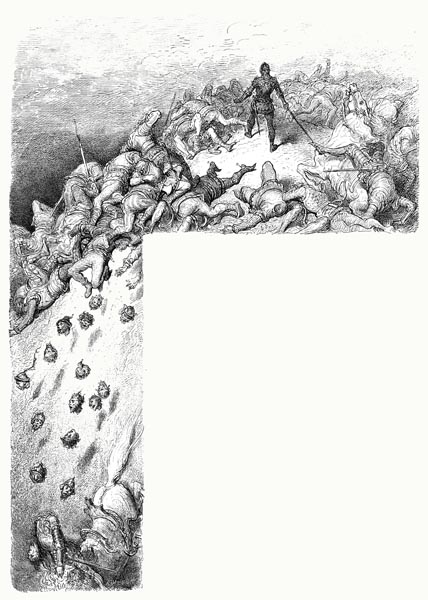
Canto IX: 1-7: Orlando roams in search of Angelica
What can cruel and traitorous Love not do
To a heart subject to his mastery?
Since in Orlando he denies what’s due
To his lord, and robs him of loyalty.
Wise and respectful he had been, one who
Had ever championed the Holy See.
Yet now shows little care, through idle love,
For king, or self, much less the Lord above.
Yet I forgive him much, am pleased to find
A companion who shares my own defect,
For I am slow to seek good, often blind,
Though swift to follow all that proves suspect.
Orlando, dressed in black, had left behind
His companions, his true friends did reject,
And reached the hosts of Africa and Spain,
Lodged in their tents, upon the open plain.
Or dislodged rather, since they’d sought shelter
From the heavy rain, in barns, neath trees,
Near or far, gaining them helter-skelter,
In groups, alone, or in their twos and threes.
Now they slept, all wearied by their labour,
Those propped on one arm, recumbent these.
They slept; their deaths he might have thus ensured,
Yet ne’er unsheathed Durindane, his sword.
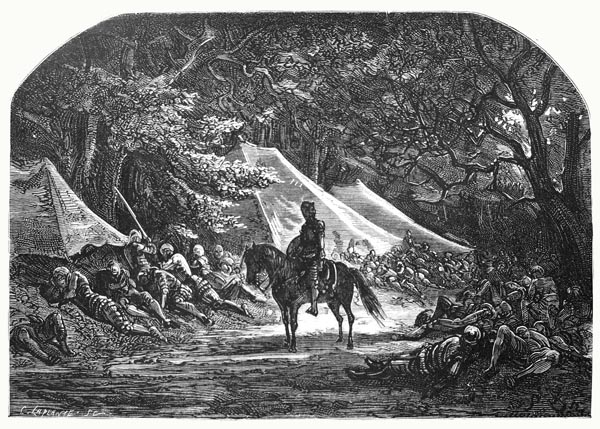
So generous was Orlando’s heart, that he
Thought it quite wrong to slay a sleeping foe,
He searched in every place for his lady,
But found her not, though he looked high and low.
If any man there woke, he asked him, sadly,
Describing her form, all her outward show,
If he had seen her and, of courtesy,
To think of any place where she might be.
And when dawn broke, and all was clear and bright,
He searched throughout the whole Moorish army,
Dressed in the garb of a Saracen knight,
So as to do so all the more safely;
It helped, indeed, that he was erudite
In many languages, not French merely,
And so well versed in Arabic that he
Might have been born and raised in Tripoli.
For three whole days, he searched the camp entire,
To the same end, then turned his attention
Towards the towns and cities, every shire,
Not only in the realm, I should mention,
But Gascony, Auvergne, each hut and byre,
Every place, and of the least dimension,
From Brittany to Provence, main to main,
And from Picardy to the ends of Spain.
Twixt the end of October, and November,
At that season when we see the trees
Divested swiftly of their leafy cover,
And all their branches trembling in the breeze,
When the restless birds, too, flock together
Orlando searched, a quest that did not cease
All winter long, and even with the spring
His fair maid continued, still, pursuing.
Canto IX: 8-13: A lady urges him to join the assault on Ebuda
Passing one day, as he had often done,
From one pleasant region to another,
He came to where the Norman and Breton,
Are parted by a sea-ward flowing river,
Now deep and swollen where’er it did run,
With rain and snow-melt, so as to cover
The bridge ahead and, thereby, close the way
As over banks and fields it sought to stray.
The paladin searched hard on every side,
(For neither fish nor water-fowl was he)
To see how he might overcome the tide,
And reach the other bank less riskily,
When suddenly, behold, a boat he spied,
And, at the stern, sat a comely lady,
Who gave a sign that right goodwill she bore
Towards him, but declined to touch the shore.
Towards the land, indeed, she would not steer,
Suspecting he might act against her will;
Orlando begged that she might yet draw near,
And bear him o’er the flood, so deep and chill,
But she replied: ‘No knight may pass, I fear,
Unless he swears, on oath, that he’ll fulfil
My dearest wish, and honour this request,
To fight in a just cause, and with the best.
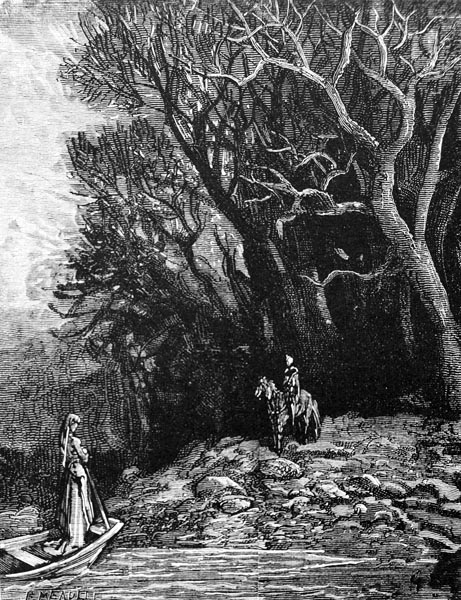
If you, sir knight, desire to pass beyond
The flood, and reach the far shore, by my aid,
Then promise me before next month has gone
That you will join the Scottish cavalcade,
For a mighty army, second to none,
Received a royal summons, and obeyed;
Their armada will assault Ebuda’s isle,
Which the cruellest of races doth defile.
For you must know that, not far from Ireland,
Where there are many isles, this one doth lie,
Ebuda, whose folk roam from land to land,
Such is their law, and seize the maids they spy.
And all the fair sex that they steal, that band
To a voracious monster then supply.
It swims each day to shore, and e’er a new
Maiden feeds on, for such fare is its due.
And merchants and pirates that pass by,
Sell them many, and many of them fair.
Reckoning on one a day, you might apply
Your mind, and say how many perish there.
Yet if pity brings a tear to your eye,
Or if for love and maidens you’ve a care,
Be pleased to join that band of the elect,
That combine to such profitable effect.’
Canto IX: 14-17: He sets out for Ireland, but is driven by a storm to Antwerp
Orlando scarcely needed to hear all,
Before he swore to be the first to fight,
As one whom evil actions did appal,
And upon whom such deeds weighed, day and night.
He was induced to think, and fear withal,
Angelica might be in such a plight,
Since he had searched so widely yet had heard
Naught of her person, not a single word.
This suspicion robbed him of all quiet,
Quashing every plan, he’d made before.
So, he determined to spread his net,
And head for that distant island shore.
Thus, he, ere the evening sun had set,
Found a boat near St. Malo, and to war
Set forth at once, and soon was out of sight,
Clearing Mont Saint-Michel that very night.
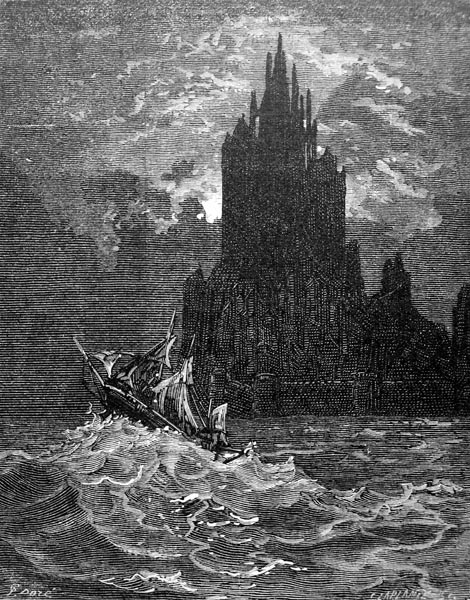
With Brieuc and Tréguier to larboard,
Orlando’s vessel skimmed the Breton shore,
And then the white chalk cliffs they steered toward,
Of England, that was Albion before.
But the southerly, that passage did afford,
Turned to a westerly, and evermore
Blew with such force the master reefed the sail,
And then fled eastwards driven by the gale.
A distance that had taken four full days
The helpless vessel now traversed in one,
Held by the master on that course always,
Lest frail as glass against the shore it run,
The wind that had blown them in that phase
Throughout four nights, now yielded to the sun,
And brought them to the Scheldt estuary,
Where Antwerp’s broad river meets the sea.
Canto IX: 18-20: Orlando is urged to meet with a noble lady
As soon as their ship, sea-worn and weary,
Entered the roads, and drew near to shore,
From the land on their starboard, swiftly,
An elderly gentleman towards them bore,
(Whose age his white-hair, indeed, showed clearly)
And turning to the nobleman, he saw
To be their leader, most courteously
Greeted them, warmly and agreeably.
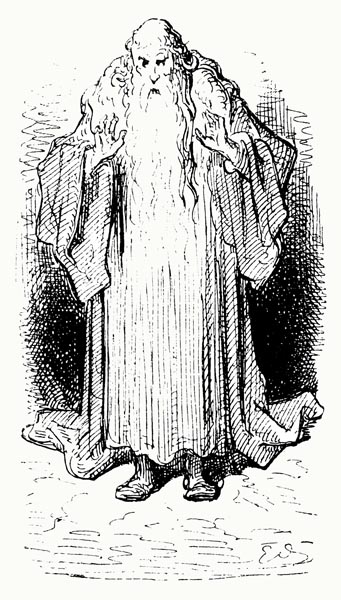
He spoke on behalf of a fair lady,
Saying that, if he chose to meet with her,
He would find her, in affability
Sweetness, beauty, above every other,
Or she could come to him there, equally,
If that were more pleasing to the stranger,
Thus, he’d prove no less accommodating
Than other warriors the waves did bring.
No other knight who’d come by sea or land
Had e’er refused to meet with this fair maid,
To give her counsel, he must understand,
In a cruel case; all thus had honour paid.
On hearing this, Orlando did command
A boat, and to the shore he swiftly made,
And then as one both kindly and well-bred,
Followed, politely, where the old man led.
Canto IX: 21-27: The Count of Holland’s daughter, Olimpia, begins her tale
Orlando was conducted through the town,
And to a palace, where they climbed the stair,
To find one there who, by her face and gown,
Seemed in mourning; jet black was her wear,
And the rooms, halls, galleries, up and down,
Were all draped likewise, in black, everywhere.
Welcoming him with heart-felt gratitude,
She seated him, and spoke, in that attitude:
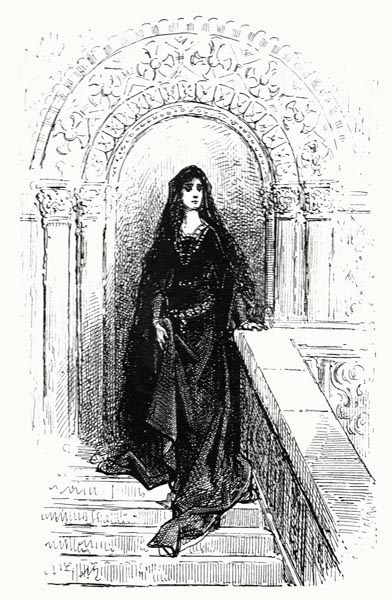
‘I would have you know I am the daughter
Of the Count of Holland,’ the lady said,
‘Though not the only child of my father,
For two fine brothers, at my side were bred;
And he proved so kind, whatever favour
I asked was granted, nor aught did I dread.
While I lived happily, in such a manner,
There came to our court a noble stranger,
The Duke of Zealand, headed for Biscay
To fight the Moors; all his peerless beauty,
In the flower of his age, perceived that day
With such love as I knew not formerly,
Made me, with scant resistance, his fair prey;
Persuaded by all he seemed, outwardly.
I thought, and think, and think it to be true,
That he loved me, and loves as none else do.
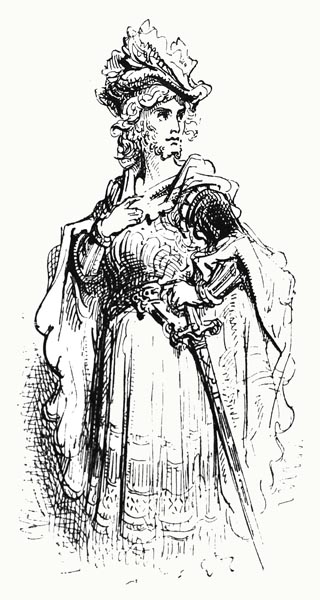
Twas then, while the wind blew contrary,
Contrary for others, for me set fair,
(A day to others, seemed an hour to me;
On swift wings fled the moments we did share)
In sweet conversation, privately,
We swore to wed, once he again was there,
With solemn rights, for so he said twould be;
Such was our promise, offered equally.
Now, Bireno had scarcely left my side,
(For such was the name my lover bore)
When Friesland’s king (whose realm lies close beside
Our own, as close as we are to the shore)
Planned that his son should take me for his bride,
(His sole son, Arbante, he had no more)
And sent the greatest nobles in his land
To my father, our marriage to demand.
I, who had no wish to break the promise
I had made my lover, could not do so;
Nor yet would Love allow me to, in this,
Should I seek such ingratitude to show;
Thus, to avert the plan, and to dismiss
That which was near fulfilment, I cried no,
Telling my father, I would not comply;
Rather than wed in Friesland, I would die.
My good father, he whose greatest pleasure
Lay in pleasing me, now troubled me not;
To solace me, who wept in full measure,
He said the marriage plan should be forgot,
Which so provoked the proud king’s displeasure,
That angered, disdainful, he chose to plot
Our downfall, entered Holland, and a war
Commenced, that saw my kindred die, and more.
Canto IX: 28-35: Cymosco, King of Friedland, wages war on Holland
Not only was he of such power possessed
That few men in this age would prove his peer,
But so skilful in war, that none professed
To match his martial strength, or came near,
Weapons he had the ancients ne’er confessed
To know, nor, but for him, our age I fear,
Such as iron tubes, two yards long or more,
That powder and iron ball hold secure.
To a vent at the rear, they touch a flame,
A vent which to the eye is less than plain;
A surgeon will create one much the same,
When he has need to open up a vein.
Thence the bullet flies to kill and maim,
Swift as lightning, with thunder in its train,
And, no less fiercely than a lightning bolt,
Will shatter and destroy, with sudden jolt.
Twice he routed our defeated army,
With this device that both my brothers slew,
The first, in the first assault, savagely
Striking his breastplate, breaking it in two;
Then, in the second, as he sought to flee
In vain, the other was cruelly slain too.
His shoulder the iron ball did arrest,
Which entered his back, and exited his chest.
And then my father was slain, defending
The only fortress that was yet untaken,
(All his others had been lost) receiving
A like blow, before it, his life forsaken;
This was as he was coming and going,
To see what was needed, on occasion,
Treacherously struck between the eyes,
By a like shot, that took him by surprise.
Father, and brothers, dead, I now remained
The only heir to this realm of Holland,
While desiring to keep what he’d gained,
It was proposed by the King of Friedland,
That peace and prosperity be maintained
By my allowing his son to win my hand;
Thus Arbante, despite my previous wish,
Might yet satisfy his own desire in this.
I, (not merely from the hatred that I felt
For him, and his vile, iniquitous kin,
That foul death to my own dear kin had dealt,
Father, and brothers, he who now would win
The realm, but for him to whom my heart-felt
Promise had been given, for I’d not sin)
I, (who’d sworn to marry not, till he again
Had returned to me from the shores of Spain)
Gave answer that I would rather suffer
A hundred ills than the one he proposed,
‘Burn me alive, and my ashes scatter
To the winds,’ I cried, to his will opposed.
My people sought to turn me in another
Direction, they being far more disposed
To peace, and so threatened to seize power,
If I chose not to yield within the hour.
Then, finding that their protests were in vain,
And that I proved as steadfast as ever,
The threats they made they chose to maintain,
And agreed that our realm they’d surrender,
And myself, to Friedland’s king, who my reign
Proposed to secure, nor would he render
Any ill to me, if I’d yield in this,
And wed his Arbante, as was his wish.
Canto IX: 36-40: Her lover, Bireno, is taken captive, and she wed to Abrante
I, who would have chosen to forego
My life, to escape the man, reflected
That a far greater regret I’d yet know
Than e’er I’d suffered, if I rejected
Thoughts of revenge, and thus, despite my woe,
Found solace in a course yet undetected,
Not saying no, stating my wish instead,
For his forgiveness, and that we be wed.
From the many who had served my father
I now chose two brothers to assist me,
Gifted with intelligence, and valour,
Selecting them more for their loyalty.
Both were raised in the court, and ever
Companions of mine from infancy,
So much so that they’d give scarce a thought
To their own safety, if but mine it bought.
To them I revealed my whole design,
While they both promised me their aid,
One as my man in Flanders I did assign,
There to ready a vessel, the other stayed
At my side. While, to this marriage of mine,
Many gathered, to court news was conveyed
That, in the Bay of Biscay, Bireno,
Had armed a fleet, and conflict must follow.
For when in that first terrible affray,
One of my own dear brothers was slain,
I had despatched a message to Biscay,
To tell Bireno of our loss and pain;
Yet while he sought to arm, day by day,
The King of Friesland conquered our domain.
Not knowing this, Bireno now set sail
To bring us aid, that we might yet prevail.
The Frisian king being advised of this,
Handed the preparations to his son,
As regards the marriage, and then with his
Whole fleet, a vast and powerful squadron,
Found my Duke, all challenge did dismiss,
Destroyed his fleet, and cast him in prison;
Which I knew not, and to the prince was wed.
He, when the sun sought his, sought out my bed.
Canto IX: 41-43: Olimpia and her servant kill Abrante on the wedding-night
Hiding himself, my servant, well-concealed
Behind a curtain, waited motionless,
Till to his eye the bridegroom was revealed,
Then, ere that prince was able to undress,
A sharp blade, he had with him, he did wield,
And Abrante’s head and neck did address,
With such force, it took both speech and life;
I, for my part, slit his throat with a knife.
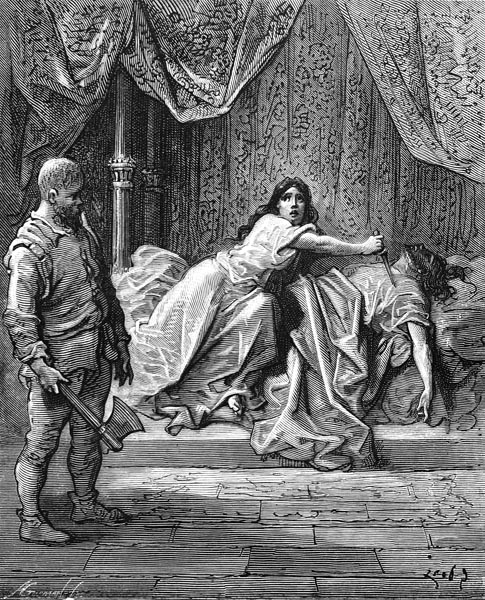
As an ox falls to the axe, the young prince died,
Despite the power of his sire, Cymosco,
Friedland’s ruler, he who had slain, beside
My father, my two brothers, as you know,
And bound me to him, then, as his son’s bride,
Gaining a stronger right to Holland so,
Planning, once I was wedded to his son,
To kill me, when my usefulness was done.
Ere the deed was known to any other,
With whatever was valuable and light,
My servant from a window did lower
Me gently, on a rope, at dead of night,
To where I was received by his brother,
On the deck of that vessel, I did alight,
Which he’d secured in Flanders; oar and sail,
Ensured the will of Heaven would prevail.
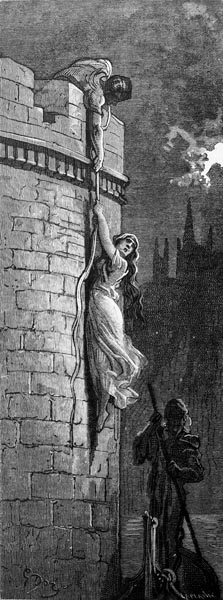
Canto IX: 44-56: She now begs Orlando’s aid
Thus, I escaped. I know not if the king
Felt greater grief for his son or greater
Anger at myself, upon arriving
The next day, and learning of the murder.
With his victorious fleet, returning,
In pride, and Bireno his prisoner,
He’d thought to attend the marriage-feast,
Yet found the city mourning the deceased.
His pity for his son, the blind hatred
He felt for me, racked him day and night;
But since pity has ne’er restored the dead,
While vengeance vents our hatred outright,
His grief, which should perhaps have led
His better self to muse on wrong and right,
United with his hatred, such that he
Sought only to retrieve, and punish, me.
Those he knew to be good friends of mine,
Or of those two brothers who assisted
In the murder, now paid a heavy fine,
Or lost all their goods, if they resisted,
Or were slain; and Bireno, at his sign,
Might thus have died, for, as he insisted,
No greater pain could he inflict on me;
But he saw he could be used cunningly.
For he made him a cruel proposition;
That in a year’s time he yet would die,
Unless he could meet this harsh condition,
That through force or deceit, some ally
(Friend or kin) Bireno must commission,
To convey me, from where’er I might lie,
To that prison; and so, his own salvation
Was dependent now on my destruction.
What could be done to secure his freedom
Short of my own surrender, had been tried,
Six fine towns in Flanders, mine their income,
I disposed of, and the proceeds applied;
Seeking to corrupt the guards with some,
Such that they might deliver him outside,
And with the rest attempting to recruit
English or German mercenaries, to suit.
My agents in this, either betrayed me,
Or were unable to perform their task;
With idle words, not aid, they repaid me;
They deceived me, and yet more gold did ask,
And the allotted year’s end must unmake me,
Since neither arms, nor gold in heavy cask,
May arrive in time, so that I might save
My lover from fresh torment, and the grave.
Through him, I lost both brothers and father,
And my own realm, too, was taken from me;
While my scant wealth, though I have no other
To sustain my life, I’ve spent unwisely,
In seeking to free my captive lover;
Nor is there aught now left, that I can see,
But to yield myself to this cruel foe,
And satisfy his vengeance, to my woe.
If there is, thus, no more that I can do,
No other means to achieve his freedom,
Than to render my life for his, that too,
To win his life with mine, to that I come.
One fear alone I have, that I shall rue
The deed, unable to extract therefrom
Assurances, so binding and complete
As to protect him from yet more deceit.
I fear that once he has me in a cage,
And has tormented me in every way,
He still will not Bireno’s pain assuage;
He thus may never see the light of day.
A perjurer he’ll prove, and in his rage,
This king will not be satisfied to slay
Myself alone, but he will do no less
To poor Bireno, in his cruel excess.
The reason that I now confer with you,
And state my cause, as I now do to all
The noblemen and knights in my purview,
Is so that, counselled thus, by those who call,
I may learn how to ensure, when I am due
To stand before the tyrant, in his hall,
That he will free Bireno, nor will shed
His blood, nor execute him, once I’m dead.
I pray that one might champion my cause,
When I am once in this vile tyrant’s power,
And see that his promise gives him pause,
And that both are exchanged at that same hour,
In such a manner that to this sole clause
He attends, and frees, from his high tower,
My Bireno, for I shall die content
If life for life I win by my consent.
Nor have I found a champion as yet,
That, upon his oath, can reassure me
That if the king his promise doth forget,
When I stand there before him, to set free
Bireno, the tyrant, unless he pays that debt,
Shall not have me; that weapon all do fear,
(That weapon which no armour can withstand,
However strong) against which none can stand.
Now if virtue is not lacking in you,
As your proud mien, and valiant form suggest,
And you believe, whatever doth ensue,
You can defend me thus, and so attest,
Be at my side, when I demand my due;
For if you do so, I’ll not fear the rest,
Since I shall know that, though I have to die,
He shall not, for I win his life thereby.’
Canto IX: 57-61: He departs to challenge Cymosco
With this the lady ended her story,
Which often had been interspersed with sighs.
Orlando, when she paused, answered briefly
Being one who seeks the good to realise,
Though, by nature, rarely speaking idly,
And, ever, all that he is asked supplies,
That he promised, and faithfully he swore,
To perform all that she wished, and more.
It was not his intention that she place
Herself in the hands of her enemy,
So as to save Bireno; he would face
This tyrant king, and save both equally,
If his sword and valour, by God’s grace,
Failed him not; and, they embarked, swiftly,
Setting sail that day, for the wind was fair,
For Cymosco’s realm, and his palace there.
Now beating on one tack, now the other,
They kept Zealand’s islands on their right;
One large isle they viewed, and then its brother,
The first concealed the second from sight.
On the third day Orlando reached another
Open strand, and from his ship did alight,
Still in Holland; though he left the lady
Aboard, till all was settled, and in safety.
Fully armed, our warrior rode the shore,
On a horse with dark brown coat, nigh on black,
Trained in Flanders, a breed that Denmark bore,
Prized for its size and power, yet speed did lack;
For, he’d left his own steed, Brigliador,
In Brittany; and mounted on its back,
There was a creature swift, and twice as fair,
One with which only Bayard could compare.
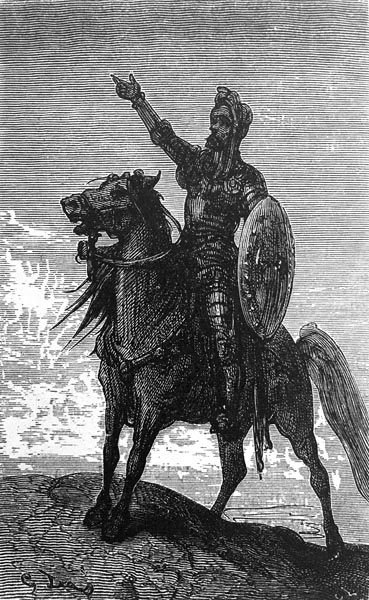
Orlando rode to Dordrecht where he found
A squadron of armed guards before the gate,
More than ever; for suspicions abound,
At the formation of a larger state.
Then, from Zealand rumours flew around,
That to save Bireno, whom they held of late,
His cousin, with an army, had set sail
To rescue the prisoner from their gaol.
Canto IX: 62-66: Cymosco sets an ambush
Orlando asked a guard who stood nearby
To speak to the king, and say that a knight
Sought with lance and sword his skill to try,
If he’d but pledge one thing before the fight,
That if the king should win the joust, thereby
Arbante’s slayer would be his of right,
For this knight errant held her life in hand,
And she could be produced at his command;
Yet also he would have the king agree
That if the knight errant were to conquer,
Bireno should be set at liberty,
And allowed to go his way, free as ever.
The guard delivered his message swiftly,
But the king, who chivalry had never
Prized nor virtue, fixed now his whole intent
On fraud and treachery, his truer bent.
It seemed to him that with the knight in hand,
He’d also have the woman who’d offended,
If this fellow did her person so command;
For such his bold message had pretended.
So, he sent thirty men, a well-armed band,
To where the knight waited, undefended.
They by a secret winding way did go
And swiftly issued forth, behind Orlando.
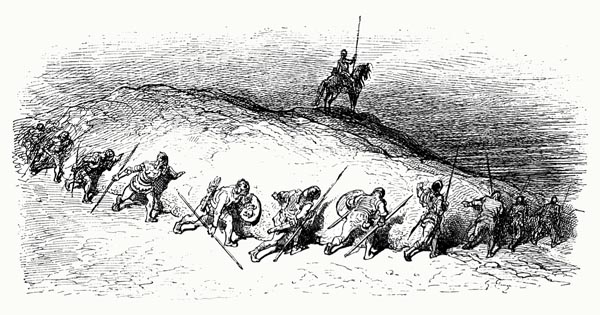
The tyrant meanwhile had the guard engage
Our warrior in talk, till he could see
His men in place, and thus had set the stage;
Then he emerged, with foot and cavalry,
In the way a hunter who is skilled and sage,
Will surround a savage beast entirely;
Or as, by the Volana, fishermen
With long nets trap the fish within their pen.
In such manner, did the Frisian king
Ensure the warrior had no means to flee;
He wanted him as yet among the living,
And thought he might achieve that readily,
Choosing not to use his cannon, that thing
Which had slain many, and brutally,
But was of little use here, where he would
Capture the knight, not finish him for good.
Canto IX: 67-71: Orlando thwarts the enemy ambush
As a wildfowler bent on larger prey,
Keeps alive a lesser bird within his snare,
And by its call, and his deception may
Draw such within his net, and hold it there,
Such was the ambush that Cymosco lay,
Wishing to catch the lady, but, beware,
Orlando’s wish was not to be so caught,
And he soon broke the circle, as they fought.
Where he saw the largest group of men,
Couching his lance, he charged at speed,
At one, and then another, and again,
At this and that one, all frail foes indeed,
Till he had pierced six, the seventh then
He was obliged to leave, slain by his steed,
Since the lance no more bodies could retain,
And the weight of six men could scarce sustain.
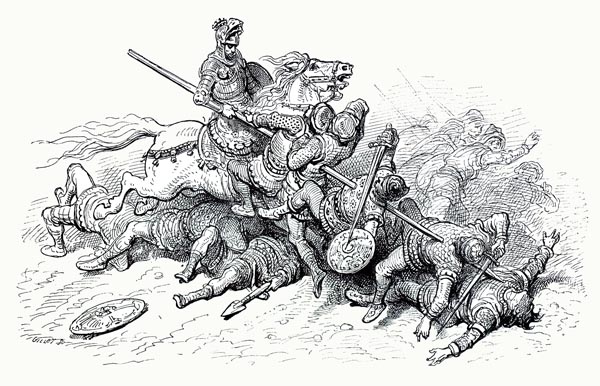
So, we may see upon the farther shore
Of some canal or moat, of frogs a host,
And a practised archer, his aim full sure,
A handful with a single shot may boast,
Or even half a dozen, though no more
Will it hold, tip to feathers filled almost.
Orlando, now abandoning his lance,
With sword in hand made furious advance.
The lance forgotten, he had drawn the blade,
A blade as yet ne’er drawn and found to fail,
And every blow, or cut, or thrust it made,
The death of his opponent did entail.
And all it touched it turned a reddish shade,
From blue, green, yellow, white, black, dark or pale.
Cymosco longed to have his cannon there,
To fire a shot, and end that whole affair.
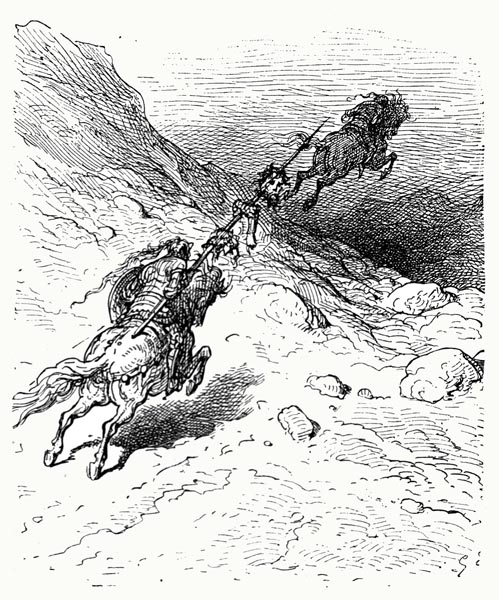
And with a great shout, gave forth his command
That it be brought there, and yet none would hear,
For those who had found safety, near to hand,
Stayed within, reluctant to appear,
The Frisian king, finding them unmanned,
Took flight to the gate now, in his fear,
And would have raised the drawbridge on high,
Had our valiant knight not come so nigh.
Canto IX: 72-80: And eventually kills Cymosco, the Frisian King
The monarch turned his face and left the knight
Master of the drawbridge, and the gate;
He fled, and overtook the rest in flight,
His steed maintaining much the faster rate.
Orlando scorned with lesser men to fight,
Wishing the tyrant to confront his fate,
But his great steed could barely stay the course,
While the other seemed to ride a winged horse.
From street to street, he’d fled before the face
Of our paladin, but afterwards returned,
Brought new arms, set the cannon in place,
Preparing the result for which he yearned,
And waiting, like a hunter in the chase,
That with his dogs, now bides his time, concerned
To spear the wild boar plunging from the brake,
Sweet victory, from near defeat, to take;
The boar that breaks the branches, topples stone,
And wherever he turns his proud mask seems,
So loud the crashing, as the saplings groan,
As if he’d topple trees, and block the streams.
So, stands Cymosco, although scarce alone,
To make Orlando pay, or so he schemes,
And as soon he appears, sets a light
To the cannon, and fires upon our knight.
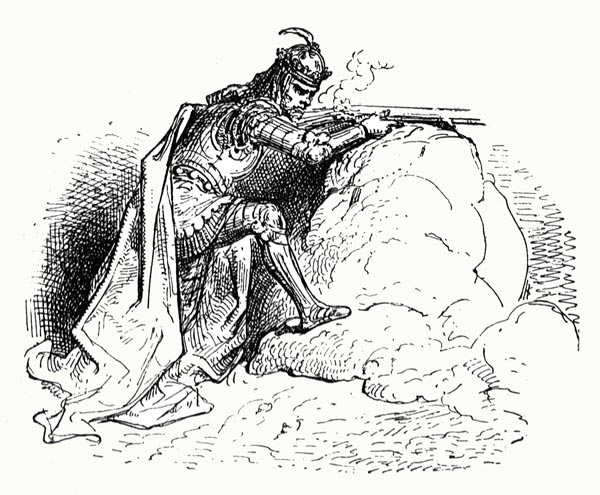
A flash, like lightning, cleared the vent behind,
The shot flew out, filled the air with thunder,
To shake the walls, the ground as if twere mined,
The heavens echoing, and the earth thereunder;
A fiery ball, it soared, now unconfined,
To strike whate’er it found, and burst asunder;
Flew hissing through the sky, as if from hell,
And seemed to strike the target as it fell.
But whether twas from haste, or his desire
To down the knight, the iron flew astray;
Or his heart, a leaf trembling in the fire,
Spoilt his aim, as he sent it on its way;
Or the Lord above scorned to thus conspire
In a deed that so true a knight might slay.
It struck the knight’s steed, its chest it tore,
And drove it to the ground, to rise no more.
Both horse and rider tumbled, but the knight
Scare touched the earth, as his charger fell,
For he rose again, his step firm and light,
And seemed to be renewed by it, as well.
As, in Libya, Anteus, in a fight
Would gain strength from the earth, so they tell,
Fresh vigour had now enhanced Orlando,
Redoubling his strength at that fierce blow.
Whoe’er sees lightning fall from out the sky,
That Jove unleashes with thunderous sound,
Where charcoal, nitre, sulphur chance to lie
In storage, when it penetrates the ground,
Finds, though it barely touches them, on high
The heavens blaze, it levels walls around,
Splits solid marble, and some fortress mars,
Sending the ramparts soaring to the stars.
Let him imagine then our warrior,
Having barely touched the earth, rising so,
Seeming so fierce and fiery, in his manner,
As to make Mars tremble; thus Orlando
Rose while the tyrant king rode for cover,
Spurring his steed as fast as it would go,
Yet Orlando ran behind him at full pace,
Faster than an arrow flies, he did race.
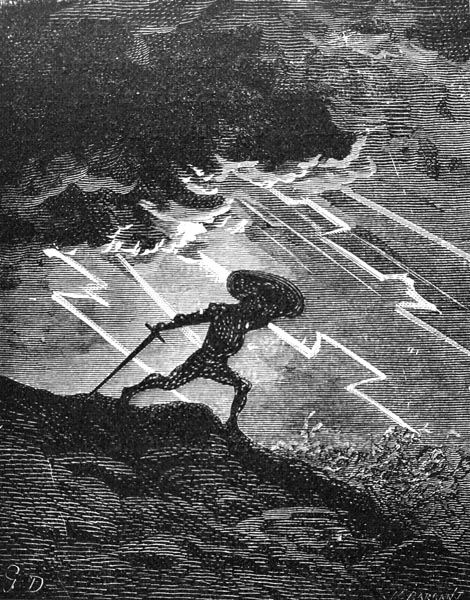
And what his steed had failed to do before
He now achieved, on foot, his speed so great
Twas faster than a thought; unless one saw
Twas hard to credit at how fast a rate
He caught the tyrant king, and then made sure
To strike him on the helm, e’er twas too late,
His blade descending to the neck below,
And felling him to the ground with the blow.
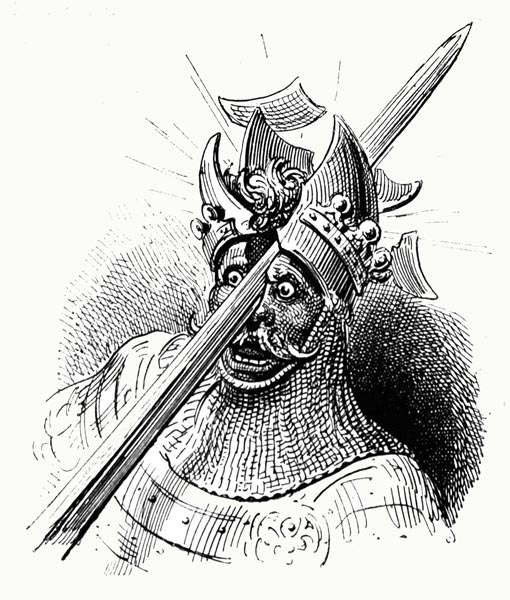
Canto IX: 81-85: Bireno’s cousin arrives, and Bireno himself is freed
Now a fresh noise arose from the city,
Another threatening clash of arms did sound,
For Bireno’s cousin, midst the army
He had led from his country, had found
The gates open, the guard-posts empty,
And entered, as Orlando roamed around,
So filling every heart with mortal fear,
He could move without hindrance, far and near.
The people were in turmoil, not knowing
Who they were, or what they might demand,
But when, by the clothes they were wearing,
And their speech, they knew they came from Zealand,
They sued for peace and, free passage granting,
Told the leader they were now at his command,
And would aid him against the Frisian king,
Who’d gaoled their duke; twas none of their doing.
The citizens had e’er opposed, they cried,
Friesland’s vile monarch, and his following,
For at his hands their former lord had died.
The king had proved unjust, unforgiving,
Mean, rapacious. Orlando now supplied,
As a friend to both, a reconciling
Voice, bringing peace and unity again;
The Frisians were imprisoned, or slain.
Seeking no key, they broke down the gate
Of the prison, and soon freed Bireno,
He expressed his thanks, and was pleased to state
His deep obligation to Orlando.
They, together with a company full great,
To the ship, and Olimpia did go,
(She to whom the dominion of that land
Belonged, as of right) as he had planned.
She had guided Orlando to the place,
With little hope that he would prosper so;
It sufficed her that, though she went to face
The tyrant, her death would free Bireno.
Revered and honoured by the populace,
It would take long to tell how she did show
Her love for him, and he for her also,
While both gave thanks to our brave Orlando.
Canto IX: 86-94: Olimpia’s realm is restored, and Orlando sets sail
The people to her father’s place restored her,
And swore fealty to her, as was her due.
While upon Bireno she did confer
Governance of herself, her country too,
Being bound to him by Love forever;
Yet he, now being drawn away anew,
Left to his dear cousin the command
Of his towns and fortresses in Holland,
For Bireno to Zealand now was bound,
With his faithful consort in company,
And thence intended to test the ground
In Friedland; for a hostage rated highly
Was now his, one that he had found
Amongst the many prisoners, lately,
Who might help him to a swift success,
For she was the tyrant’s daughter, no less,
And, he said, he had a younger brother,
To whom he proposed she might be wed.
Orlando set sail the same day, moreover,
As Bireno, wherever fortune led,
But would take none of the gifts however
Extended to him, requesting instead,
That thing of iron, which when deployed
An effect much like to lightning enjoyed.
In taking it, twas far from his intention
To use the cannon in his own defence,
Considering it a perverse invention
Not worthy of his quest when he went thence,
But of what he planned for it, made mention,
Since its power to main was so immense:
He bore it away, powder, shot and all,
So none to its lethal onslaught should fall.
And then, once he was far enough from shore,
His vessel riding fair upon the deep,
Where every sign had been lost once more
Of the land on either side, the wind asleep,
He seized the thing, and cried: ‘Your roar
Shall never aid some coward knight to reap
Advantage, or to claim a greater worth
Than men of valour; vanish from the earth!
O, vile, abominable ordinance,
Fashioned in the depths of Tartarus,
By Beelzebub, as an infernal lance
To wreck this mortal world, O ruinous
Engine, I shall send you down, perchance,
To hell itself, from whence you came!’ and thus,
He drowned it in the waves; and then set sail
For the cruel island, yet let sense prevail,
For so great was Orlando’s wish to know
If his lady might be prisoned on that isle,
(She, whom above all others, he loved so,
While his life without her seemed but vile)
He’ll not set foot ashore again, but go
Straight to that place, nor pause the while,
Lest some new venture might cause him to say:
‘Oh, that I had but hastened on my way!’
Nor in England nor in Ireland he shall land,
Nor, ere then, visit the opposing shore.
But let him go, whom Love holds in his hand,
Struck, by that naked archer, to the core.
For I now choose to return to Holland,
And of our brave warrior speak no more,
(As yet) and invite you too, well-knowing
You, also, would hate to miss a wedding.
The marriage feasts should be sumptuous there,
Yet not more so than Zealand seeks to hold,
Nor yet the ceremonies half so fair;
But tis not my design that you be told
Of any such, quite other is my care;
Since all’s delayed, as fresh events unfold,
That in another canto must appear,
If another canto you desire to hear.
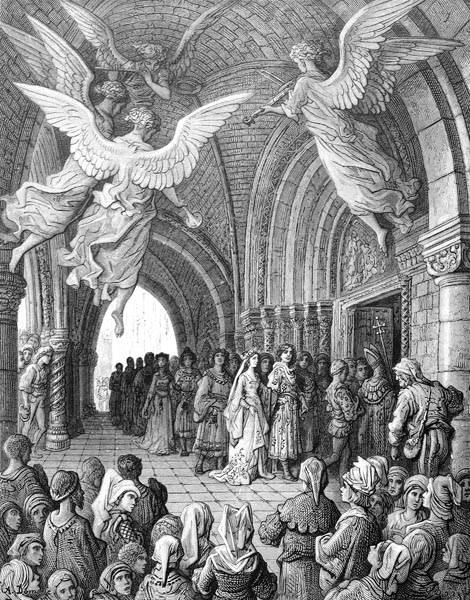
The End of Canto IX of ‘Orlando Furioso’